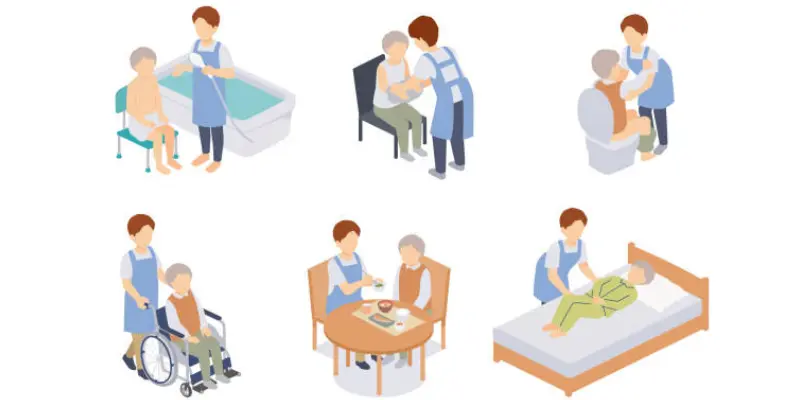Top AI Caregiver Tools for 2025
Published: 5 May 2025
In 2025, technology is making caregiving easier than ever before. AI-powered tools are helping caregivers provide better care with less stress. Whether it’s managing medications, offering emotional support or assisting with physical mobility, these tools can be a game-changer for those finding care for loved ones.
AI caregiver tools are designed to support caregivers by taking over certain tasks and providing real-time assistance. With these tools, caregivers can focus more on the emotional side of care while technology handles some of the day-to-day responsibilities.
My previous post was a comprehensive guide on AI Caregivers. In this post, I will explore the top AI caregiver tools for 2025 and show how they can make caregiving more manageable and effective.

What Makes AI Caregiver Tools Special?
AI caregiver tools are not just fancy gadgets; they are designed to make caregiving easier, safer and more efficient. These tools use smart technology to assist with various caregiving tasks such as monitoring health, reminding patients about medication and providing companionship.
How do AI tools help caregivers?
AI tools can save time and reduce stress by automating daily tasks. For example, they can track a patient’s health stats in real-time, remind caregivers about important tasks, or even provide emotional support when needed. This means caregivers don’t have to manage everything on their own.
Why is this important?
Caregiving can be exhausting both physically and emotionally. With AI tools, caregivers can get help with routine tasks, allowing them to focus on providing better care and support. These tools can improve the quality of care, reduce the chance of errors and even prevent caregiver burnout.
Top AI Caregiver Tools for 2025
In 2025, several AI tools are transforming caregiving by offering smart solutions to everyday challenges. Let’s take a look at some of the best tools available.
1: AI-Powered Health Monitoring Devices
AI-powered health monitoring devices are changing the way caregivers keep track of a patient’s health. These wearable devices can track key vital signs like heart rate, blood pressure and even sleep patterns. They offer real-time data that can be shared with caregivers, making it easier to spot early warning signs of health issues. These tools help the caregivers to stay informed without physical visits.
- Real-time monitoring: Devices like smartwatches continuously track health data such as heart rate, steps and blood oxygen levels.
- Immediate alerts: If any health parameter goes out of range, caregivers are notified immediately, allowing for quick action.
- Long-term tracking: Data collected over time can help caregivers and doctors understand health trends and make better-informed decisions.
Example: A smartwatch, like the Apple Watch, can alert caregivers if a patient’s heart rate goes too high or too low, giving them a chance to intervene before it becomes a serious issue.
2: Virtual Health Assistants
Virtual health assistants are AI-powered apps or devices that help in managing day-to-day health routines. These medical AI assistants can remind patients to take their medications, track symptoms and even provide emotional support. With these assistants, caregivers can ensure that their loved ones stay on track with their health needs, hereby reducing the mental load and offering peace of mind.
- Medication reminders: Virtual assistants send alerts to remind patients when it’s time to take their medication or attend appointments.
- Health tracking: These assistants can monitor symptoms, such as pain levels or energy, to share with caregivers or doctors.
- Personalized advice: Some assistants provide daily health tips and wellness recommendations based on the user’s health status.
Example: CarePod is an AI-powered assistant. It sends daily reminders to patients about medications, offers encouragement and helps caregivers to track their patients’ well-being.

3: AI Robotics for Physical Assistance
AI-powered robots are designed to assist patients with mobility issues or help with daily tasks like lifting or moving. These robots can support patients in regaining independence, making caregiving less physically demanding. Whether it’s helping someone get out of bed or assisting with walking, these tools offer caregivers valuable help in providing safe and effective care.
- Assisting mobility: Robotic exoskeletons can help patients who have difficulty in walking stand and move more easily.
- Reducing physical strain: These robots can lift patients or assist with other tasks, reducing the risk of injury.
- Improving independence: By providing physical support, robots help patients regain some independence and feel more in control.
Example: Robotic exoskeletons like the ReWalk are here to assist individuals with spinal cord injuries by allowing them to stand and walk with support, improving both mobility and self-esteem.
4: AI for Emotional Support and Companionship
AI companions provide emotional support and companionship for patients, especially those who feel isolated or struggle with mental health. These tools are designed to engage in conversations, remind patients to stay active and even offer mental wellness activities. For caregivers, these AI companions can reduce the emotional burden of care and offer an additional layer of support.
- Reducing loneliness: AI companions can chat with patients and offer friendly conversation and emotional support.
- Mental wellness: Some AI companions suggest activities like breathing exercises or games to improve mood and reduce anxiety.
- Motivating patients: These companions remind patients to engage in physical activities or hobbies, promoting overall well-being.
Example: ElliQ is an AI companion designed for older adults. It interacts with patients by offering fun activities, suggesting exercises and reminding them to take care of their health.
5: AI in Medication Management
AI tools in medication management help caregivers ensure that patients take the correct medication at the right time. These tools track prescriptions, send reminders and even provide automatic medication dispensing. By reducing human error, these tools can improve medication adherence and prevent health complications caused by missed doses.
- Automatic pill dispensers: AI-powered devices like MedMinder automatically dispense the correct medication at the scheduled time.
- Medication tracking: These tools keep track of doses taken and missed, offering caregivers a detailed log.
- Prescription refills: AI tools can automatically reorder medications when supplies run low, preventing lapses in treatment.
Example: MedMinder is a smart pill dispenser that reminds patients to take their medication and ensures that only the correct dose is dispensed which reduce the chances of errors or missed doses.
How to Choose the Right AI Caregiver Tool
Choosing the right AI caregiver tool can feel overwhelming but it’s important to pick one that matches both the needs of your loved one and your caregiving style. Here are some tips to help you make the best choice.

Identify the Key Needs
Start by understanding the specific challenges your loved one faces. Do they need help with health monitoring, medication management, mobility or emotional support? Pinpointing their main needs will help you choose the right tool.
Look for Ease of Use
AI tools should be easy to set up and use, especially for those who might not be tech-savvy. Look for tools with clear instructions and a user-friendly interface.
Consider Support and Integration
Choose tools that offer strong customer support and can integrate with other devices or apps. This ensures you can easily update, manage and monitor the tool as needed.
Think About Budget and Long-Term Value
While AI tools can be an investment, consider the long-term benefits. Some tools offer subscription plans or one-time purchases. Make sure to choose one that fits your budget while offering value for the long run.
Tips for Using AI Caregiver Tools Effectively
Once you have chosen the right AI caregiver tools, it’s important to use them effectively to get the most benefit. Here are some practical tips to help you make the most out of these tools.
1. Set Up Alerts and Notifications
Most AI tools offer alerts for important events like medication reminders or health changes. Set these alerts up to ensure nothing is missed.
- Tip: Customize alerts based on your loved one’s needs, so you get notified at the right time.
2. Regularly Check for Software Updates
AI tools often receive software updates to improve performance and add new features. Make sure to keep the software up-to-date to ensure your tools are running smoothly.
- Tip: Set your tool to update automatically if it has that option, or schedule regular check-ins to manually update.
3. Teach Your Loved One How to Use the Tool
If the AI tool involves interaction from the patient like a virtual health assistant, take time to teach them how to use it. This will help them feel more comfortable and get the most benefit.
- Tip: Walk through the features with them and make sure they know how to ask for help if needed.
4. Monitor the Data Regularly
For health tracking tools, it’s important to check the data regularly. This will help you spot trends or changes that might require attention.
- Tip: Review health data at least once a week to catch any concerning patterns early.
Conclusion
AI caregiver tools are making a big difference in how we care for our loved ones. These AI tools help to manage health, provide emotional support and even reduce physical strain on Doctors. By choosing the right tools and using them effectively, you can improve the quality of care and make your daily tasks easier and more efficient. Remember to keep it simple, pick tools that fit your needs and stay consistent in using them.
The future of caregiving is bright with AI and by using these tools, you are giving your loved ones the best support possible. Don’t hesitate to explore different options, try out features and see what works best for you and your family.
Have you tried any AI caregiver tools yet? Share your experiences or questions below!
FAQs About AI Caregiver Tools for 2025
Most AI caregiver tools range from $100-$500 for basic monitoring devices to $2,000-$5,000 for advanced robotic assistance systems. Monthly subscription fees for virtual health assistants typically range from $15-$50 depending on features. Many insurance plans now offer partial coverage for these tools, especially when prescribed by a healthcare provider.
AI caregiver tools use encryption and secure data storage to protect sensitive health information. Most reputable companies comply with health privacy regulations like HIPAA and allow users to control who can access their data. Before purchasing, check the privacy policy and security features to ensure your data will be properly protected.
AI tools are designed to supplement not replace human caregivers by handling routine tasks and monitoring. They provide valuable support that allows human caregivers to focus on emotional connection and complex care decisions. The most effective caregiving approach combines compassionate human care with AI assistance for monitoring and routine management.
Most modern AI caregiver tools are designed with simplicity in mind, featuring guided setup processes and intuitive interfaces. Many companies offer free setup assistance, either remotely or in-person, especially for older adults or those with limited technical experience. Tutorial videos and 24/7 customer support are typically available to help overcome any setup challenges.
Most AI caregiver tools have backup batteries that can last 8-24 hours during power outages. Many devices can store critical data locally until internet connection is restored, then sync once back online. For critical medical needs, look for devices with cellular backup options that don’t rely solely on home Wi-Fi.
Yes, most AI caregiver tools allow for personalization based on specific health conditions through custom settings and programming. For conditions like diabetes, Alzheimer’s or heart disease, specialized features can be activated to monitor relevant symptoms and provide appropriate care. Many platforms allow healthcare providers to input specific care protocols tailored to individual health needs.
AI companions use natural language processing to engage in meaningful conversations and respond appropriately to emotional cues. They can recognize signs of distress or loneliness and respond with encouraging words, suggest mood-lifting activities or alert human caregivers if needed. Regular interaction with AI companions has been shown to reduce feelings of isolation and improve overall mental wellbeing in clinical studies.
Many AI caregiver tools function independently without requiring the care recipient to use a smartphone or computer. While caregiver monitoring often works through smartphone apps, the devices themselves typically have simple, dedicated interfaces designed for ease of use. Some systems use voice commands, touch screens or simple button interfaces specifically designed for those who are unfamiliar with technology.
Modern AI health monitoring devices have accuracy rates of 90-95% for detecting significant health events like falls or irregular heartbeats. False alarms have decreased significantly with improved AI algorithms that can distinguish between concerning events and normal variations. Most systems allow for sensitivity adjustments to balance between catching every potential issue and avoiding unnecessary alerts.
Many AI tools offer specialized features for cognitive impairments including simplified interfaces and repetitive gentle reminders. For dementia patients, tools like GPS tracking, wandering prevention and familiar voice recordings can enhance safety and provide comfort. The best results come when caregivers carefully introduce these tools early in disease progression and consistently reinforce their use through gentle guidance.





